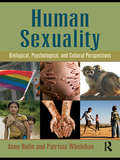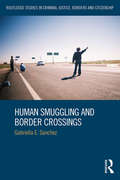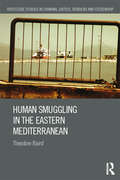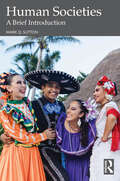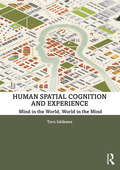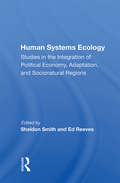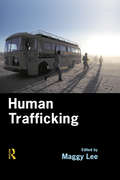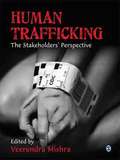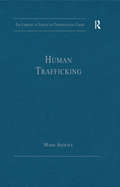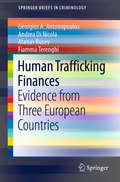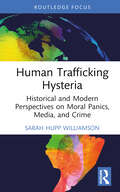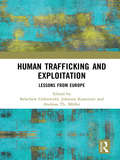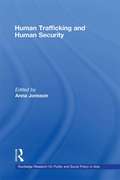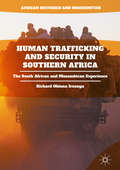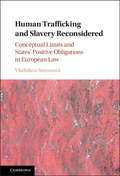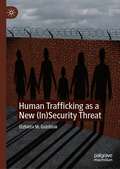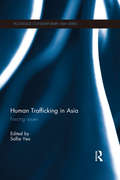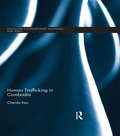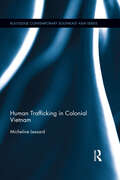- Table View
- List View
Human Sexuality in Medical Social Work
by H Lawrence Lister David A ShoreParticularly valuable to social workers and health care personnel, this timely volume offers practical guidelines and unique treatment approaches to use with clients who have sex-related problems. Experts address sexual health and social work intervention in sexual problems. They also present important information on significant health problems--cancer, chronic illness; patient characteristics; and special issues, which illustrate the various social work intervention responses available to meet patients’sexual problems.
Human Sexuality: Biological, Psychological, and Cultural Perspectives
by Anne Bolin Patricia WhelehanHuman Sexuality: Biological, Psychological, and Cultural Perspectives is a unique textbook that provides a complete analysis of this crucial aspect of life around the world. Utilizing viewpoints across cultural and national boundaries, and deftly weaving evolutionary and psychological perspectives, Bolin and Whelehan go beyond the traditional evolution and primatology to address cross-cultural and contemporary issues, as well as anthropological contributions and psycho-social perspectives. Taking into account the evolution of human anatomy, sexual behavior, attitudes, and beliefs, this far-reaching text goes beyond what is found in traditional books to present a wide diversity of beliefs, attitudes, and behaviors found globally. In addition to providing a rich array of photographs, illustrations, tables, and a glossary of terms, this extraordinary textbook explores: pregnancy and childbirth as a bio-cultural experience life-course issues related to gender identity, sexual orientations, behaviors, and lifestyles socioeconomic, political, historical, and ecological influences on sexual behavior early childhood sexuality, puberty and adolescence birth control, fertility, conception, and sexual differentiation HIV infection, AIDS, AIDS globalization and sex work Fusing biological, socio-psychological, and cultural influences to offer new perspectives on understanding human sexuality, its development over millions of years of evolution, and how sexuality is embedded in specific socio-cultural contexts, this is the text for educators and students who wish to understand human sexuality in all of its richness and complexity.
Human Sexuality: Biological, Psychological, and Cultural Perspectives
by Anne Bolin Patricia Whelehan Muriel Vernon Katja AntoineThis groundbreaking second edition of Human Sexuality continues its broad and interdisciplinary goal of providing readers with a comprehensive overview on sexuality as a core part of our individual identities and social lives. Edited by anthropological experts on the subject, this unique textbook integrates evolutionary and cultural aspects to provide a fully interdisciplinary approach to human sexuality that is rare in this area of scholarship. Fully updated throughout in line with developments in the field, this second edition includes fresh material exploring new sexual identities, sexual violence and consent, Internet pornography, conversion therapy, polyamory, and much more. In addition to providing a rich array of photographs, illustrations, tables, and a glossary of terms, this textbook explores: pregnancy and childbirth as a bio-cultural experience life-course issues related to gender identity, sexual orientations, behaviors, and lifestyles socioeconomic, political, historical, and ecological influences on sexual behavior early childhood sexuality, puberty, and adolescence birth control, fertility, conception, and sexual differentiation HIV infection, AIDS, AIDS globalization, and sex work. Utilizing viewpoints across cultural and national boundaries and taking into account the evolution of human anatomy, sexual behavior, attitudes, and beliefs across the globe, Human Sexuality, Second Edition, remains an essential text for educators and students who wish to understand human sexuality in all of its richness and complexity.
Human Skeletal Remains: A Field Guide to Identification, Recovery, and Preservation
by Teresa A. White Hillary R. Parsons Samuel S. WhiteHuman Skeletal Remains is a step-by-step field guide to teach proper recovery techniques when a forensic anthropologist is unavailable for immediate scene responses.In the absence of a forensic anthropologist, the investigator assumes the responsibility of ensuring the complete and accurate recovery of skeletal materials from scenes. This could be problematic if the investigator has not had specialized training in human remains recoveries. To help investigators carry out this task, the authors developed this guide using 328 full-color demonstrative photos with easy-to-follow instructions on how to identify and recover human skeletal remains using scientifically defensible methods. It is an excellent resource for law enforcement, medicolegal death investigators, CSIs, anthropologists, medical examiners, coroners, evidence recovery technicians, students, and other forensic professionals.Features Side-by-side photographic comparisons of adult and juvenile human remains with nonhuman bones Start to finish demonstration of proper recovery techniques involving scenes with surface scattered and buried human remains Preservation considerations with respect to cultural sensitivity and ethical practices Human Skeletal Remains is an illustrative tool designed to accompany you on scene. Use it to identify the bones you locate, then follow the instructions to recover them. Get it dirty!
Human Smuggling and Border Crossings (Routledge Studies in Criminal Justice, Borders and Citizenship)
by Gabriella SanchezGraphic narratives of tragedies involving the journeys of irregular migrants trying to reach destinations in the global north are common in the media and are blamed almost invariably on human smuggling facilitators, described as rapacious members of highly structured underground transnational criminal organizations, who take advantage of migrants and prey upon their vulnerability. This book contributes to the current scholarship on migration by providing a window into the lives and experiences of those behind the facilitation of irregular border crossing journeys. Based on fieldwork conducted among coyotes in Arizona - the main point of entry for irregular migrants in the United States by the turn of the 21st Century - this project goes beyond traditional narratives of victimization and financial exploitation and asks: who are the men and women behind the journeys of irregular migrants worldwide? How and why do they enter the human smuggling market? How are they organized? How do they understand their roles in transnational migration? How do they explain the violence and victimization so many migrants face while in transit? This book is suitable for students and academics involved in the study of migration, border enforcement and migrant and refugee criminalization.
Human Smuggling in the Eastern Mediterranean (Routledge Studies in Criminal Justice, Borders and Citizenship)
by Theodore BairdThe organization of human smuggling from the Middle East and Africa through Turkey and the Eastern Mediterranean has become a contemporary political concern throughout Europe, receiving intense and polarised media attention. This timely book reformulates how we conceive of human smuggling, challenging popular and political conceptions of the practice in Europe. This book proposes a new framework for examining the causes and effects of human smuggling in the Mediterranean, analysing the contingent patterns of human smuggling in the countries of the Eastern Mediterranean with a geographic focus on Turkey. Building on unique empirical material from fieldwork in Turkey and Greece, this book describes the rise of human smuggling as a practice, viewed through a framework of multiple 'contingencies'. Uniquely, this book includes in-depth testimonies of migrants who have survived crossing the Aegean Sea and details the strategies and tactics of the facilitators who help them. In Human Smuggling in the Eastern Mediterranean, Theodore Baird puts a human face to the tragedies occurring in the Mediterranean while maintaining that contingent historical, political, economic, and geographic forces have aligned to propel the practice of human smuggling forward. The book will be of interest to scholars working in migration studies, as well as scholars in the fields of sociology, criminology, law, political science, anthropology, and geography.
Human Societies: A Brief Introduction
by Mark Q. SuttonHuman Societies: A Brief Introduction succinctly covers the basic concepts of cultural anthropology in a way that is relevant and engaging to the introductory student. Less time is spent on anthropological detail and more time on the relevance of anthropological understanding to the contemporary world.The issues facing the contemporary Western world are also confronting the thousands of other societies. The book deals with topics such as the variety of sexualities, the thousands of religions, how people adapt to their environments, the ways people organize themselves, the multitude of foods and cuisines, adaptations to climate change, refugees and migrants, and the many different approaches to reproduction; all topics to which students should already be generally aware. Included are succinct chapters discussing personality; adaptation; social, political, and economic organization; food and diet; sex and gender; religion and ritual; and change and development. The book also includes short “Spotlight” boxes that enlighten the reader about specific topics of interest, as well as chapter summaries, exercises, key terms, and a comprehensive glossary.Human Societies: A Brief Introduction is essential reading for undergraduate students taking their first steps into cultural and applied anthropology.
Human Spatial Cognition and Experience: Mind in the World, World in the Mind
by Toru IshikawaThis book offers students an introduction to human spatial cognition and experience and is designed for graduate and advanced undergraduate students who are interested in the study of maps in the head and the psychology of space. We live in space and space surrounds us. We interact with space all the time, consciously or unconsciously, and make decisions and actions based on our perceptions of that space. Have you ever wondered how some people navigate perfectly using maps in their heads while other people get lost even with a physical map? What do you mean when you say you have a poor "sense of direction"? How do we know where we are? How do we use and represent information about space? This book clarifies that our knowledge and feelings emerge as a consequence of our interactions with the surrounding space, and show that the knowledge and feelings direct, guide, or limit our spatial behavior and experience. Space matters, or more specifically space we perceive matters. Research into spatial cognition and experience, asking fundamental questions about how and why space and spatiality matters to humans, has thus attracted attention. It is no coincidence that the 2014 Nobel Prize in Physiology or Medicine was awarded for research into a positioning system in the brain or "inner GPS" and that spatial information and technology are recognized as an important social infrastructure in recent years. This is the first book aimed at graduate and advanced undergraduate students pursuing this fascinating area of research. The content introduces the reader to the field of spatial cognition and experience with a series of chapters covering theoretical, empirical, and practical issues, including cognitive maps, spatial orientation, spatial ability and thinking, geospatial information, navigation assistance, and environmental aesthetics.
Human Systems Ecology: Studies In The Integration Of Political Economy, Adaptation, And Socionatural Regions
by Sheldon Smith Ed ReevesThis book presents nine case studies which illustrate an approach to the interface between human ecology, political economy, and adaptive decision making, demonstrating the power of analyzing socionatural regions from a human systems ecology perspective.
Human Targets: Schools, Police, and the Criminalization of Latino Youth
by Victor M. RiosAt fifteen, Victor Rios found himself a human target—flat on his ass amid a hail of shotgun fire, desperate for money and a place on the street. Faced with the choice of escalating a drug turf war or eking out a living elsewhere, he turned to a teacher, who mentored him and helped him find a job at an auto shop. That job would alter the course of his whole life—putting him on the road to college and eventually a PhD. Now, Rios is a rising star, hailed for his work studying the lives of African American and Latino youth. In Human Targets, Rios takes us to the streets of California, where we encounter young men who find themselves in much the same situation as fifteen-year-old Victor. We follow young gang members into schools, homes, community organizations, and detention facilities, watch them interact with police, grow up to become fathers, get jobs, get rap sheets—and in some cases get killed. What is it that sets apart young people like Rios who succeed and survive from the ones who don’t? Rios makes a powerful case that the traditional good kid/bad kid, street kid/decent kid dichotomy is much too simplistic, arguing instead that authorities and institutions help create these identities—and that they can play an instrumental role in providing young people with the resources for shifting between roles. In Rios’s account, to be a poor Latino youth is to be a human target—victimized and considered an enemy by others, viewed as a threat to law enforcement and schools, and burdened by stigma, disrepute, and punishment. That has to change. This is not another sensationalistic account of gang bangers. Instead, the book is a powerful look at how authority figures succeed—and fail—at seeing the multi-faceted identities of at-risk youths, youths who succeed—and fail—at demonstrating to the system that they are ready to change their lives. In our post-Ferguson era, Human Targets is essential reading.
Human Trafficking
by Maggy LeeHuman Trafficking provides a critical engagement with the key debates on human trade. It addresses the subject within the broader context of global crime and the internationalisation of crime control. The book takes a broadly discursive approach and draws on historical, comparative as well as the latest empirical material to illustrate and inform the discussion of the major trends in human trafficking. The book helps to develop fresh theoretical insights into globalisation, exclusion and governance, and identifies a new research agenda that will ensure the book is of interest to advanced level students as well as academic scholars.
Human Trafficking
by Veerendra MishraTrafficking of persons is a modern-day form of slavery, threatening the dignity and security of millions of people throughout the world. Virtually every country in the world and every state of India is affected by this crime as a place of origin, transit or destination for victims. This book is an attempt to discuss various issues of human trafficking, including perspectives of various stakeholders. The book argues that crime cannot be dealt with only by applying piecemeal tactics. Instead, it will require an organised professional, multi-disciplinary and multi-agency approach, calling for concerted, collaborative and participatory efforts of all stakeholders. All the essays included in this book are original works delving deeply into various forms of human trafficking. They are organised into different themes such as sexual exploitation, child trafficking, trafficking outside India, legal aspects, state experiences and case studies.
Human Trafficking (The Library of Essays on Transnational Crime)
by Marie SegraveHuman trafficking captured the attention of the global community well over a decade ago, inspiring multifarious international, national, regional and local responses. While formally recognized as one of the major threats associated with transnational organized crime, human trafficking remains an issue about which much has been written and yet little is known or supported by empirical evidence. The essays selected for this volume reflect four key areas of debate: the transnational organized crime framework; the data and research landscape; the implementation of anti-trafficking responses; and the articulation of alternative responses to human trafficking. These essays are written by well-known and more recent contributors to this field of research. The collection draws attention to contemporary arguments as well as recent empirical research, and points to the importance of contextualizing human trafficking within both the global and local setting. This volume reflects where human trafficking data, research and debate is currently located and where it is heading, and as such is of interest to academics, students, policymakers and practitioners.
Human Trafficking Around the World: Hidden in Plain Sight
by Rita Simon Stephanie HepburnThis unprecedented study of sex trafficking, forced labor, organ trafficking, and sex tourism across twenty-four nations highlights the experiences of the victims, perpetrators, and anti-traffickers involved in this brutal trade. Combining statistical data with intimate accounts and interviews, journalist Stephanie Hepburn and justice scholar Rita J. Simon create a dynamic volume sure to educate and spur action.Hepburn and Simon recount the lives of victims during and after their experience with trafficking, and they follow the activities of traffickers before capture and their outcomes after sentencing. Each chapter centers on the trafficking practices and anti-trafficking measures of a single country: Australia, Brazil, Canada, Chile, China, Colombia, France, Germany, India, Iran, Iraq, Israel, Italy, Japan, Mexico, Niger, Poland, Russia, South Africa, Syria, Thailand, the United Arab Emirates, the United Kingdom, and the United States. Examining these nations' laws, Hepburn and Simon reveal gaps in legislation and enforcement and outline the cultural norms and biases, societal assumptions, and conflicting policies that make trafficking scenarios so pervasive and resilient. This study points out those most vulnerable in each nation and the specific cultural, economic, environmental, and geopolitical factors that contribute to each nation's trafficking issues. Furthermore, the study also highlights common phenomena that governments and international anti-traffickers should consider in their fight against this illicit trade.
Human Trafficking Finances: Evidence from Three European Countries (SpringerBriefs in Criminology)
by Georgios A. Antonopoulos Andrea Di Nicola Atanas Rusev Fiamma TerenghiThis unique volume addresses the financial mechanisms that enable human trafficking - its actors, structures, and logistics. Viewing each stage of the market, human traffickers may need significant financial resources for recruitment, transportation, and exploitation. Drawing upon cross-disciplinary research expertise in criminology, sociology, law and economics, this book offers insights from law enforcement officers, policy makers, NGOs, and traffickers and their victims. Using three European countries - Bulgaria, Italy and the United Kingdom - it provides an account on the sources of capital for initiating and sustaining a human trafficking scheme, discussing the involvement of criminal structures, legitimate businesses, financial institutions, and information and communication technologies in the running of these enterprises. It also addresses the ways in which entrepreneurs and customers settle payments, the costs of conducting business in human trafficking, and how profits from the business are spent and invested.This important contribution to the transnational organized crime knowledge base will be of interest to researchers and academics, as well as law enforcement, regulatory agencies, and policy makers combating human trafficking.
Human Trafficking Hysteria: Historical and Modern Perspectives on Moral Panics, Media, and Crime (Routledge Studies in Crime, Culture and Media)
by Sarah Hupp WilliamsonThrough cultural criminology, this book brings together existing research to provide an overview of historical and modern moral panics related to human trafficking.What do you picture when you hear the words human trafficking? Perhaps you imagine someone kidnapped and sold as shown in films or worry that sex trafficking increasingly occurs online or in big cities during major events. While sex trafficking does occur, the reality of human trafficking is complex, though this reality is often obscured by the media. The media has played a large role in shaping understanding of this crime, with panics, conspiracies, and misinformation abounding. This book uses cultural criminology to break down historical and modern panics to understand the links between media portrayals of human trafficking, perpetuation of stereotypes, and influences on policy. The text examines the impacts of human trafficking panics perpetuated by media, including understanding the origins of human trafficking in the nineteenth-century White slave panic, the ways that popular media perpetuates stereotypes, the reality of trafficking at sporting events, and the role of social media in generating misinformation.Human Trafficking Hysteria is a valuable resource for criminology and sociology classes, as well as special-topics classes on sex crimes, victimization, or the media.
Human Trafficking and Exploitation: Lessons from Europe
by Belachew Gebrewold Johanna Kostenzer Andreas Th. MüllerHuman trafficking is a serious human rights violation that leads to the gross exploitation of its victims, who are coerced into forced labor and slavery across the globe. As the current migration movement and refugee situation reaches crisis point in Europe, the risk of human trafficking from the Mediterranean Sea through Italy into Central and Western Europe has become a critical emergency. Focusing on human trafficking along this route into Europe, this book discusses the systematic exploitation of victims and the subsequent violation of human rights within an international context, providing an overview of the causes, regulation and prevention of the issue. Academic researchers, practitioners and policy-makers are brought together to provide both theoretical perspectives and practice-based approaches for addressing the issue of human trafficking. As well as scholarly contributions from experts in the field, the book also includes experiences and strategies of policy-makers and practitioners from governmental and non-governmental organizations, along with the real-life scenarios and practice reports. Human Trafficking and Exploitation should be considered essential reading for academics, policy-makers, advocates and activists interested in preventing human trafficking and protecting human rights. It will also be of interest to those with research interests within the broader themes of law, politics and international relations and social and health policy.
Human Trafficking and Human Security (Routledge Transnational Crime and Corruption #Vol. 4)
by Anna JonssonHuman trafficking, and the related problems of organised crime and prostitution, has become a serious problem for post-Soviet countries since the dissolution of the Soviet Union. Human trafficking has a major impact on the countries of origin, the destination countries and the countries of transit, and is a concern for those studying population and migration, economics, politics, international relations and security studies. This book examines human trafficking from post-Soviet countries, exploring the full extent of the problem and discussing countermeasures, both local and at the global level, and considering the problem in all its aspects. It focuses in particular on the experiences of the Baltic Sea region, setting out the nature of organised crime and the full range of threats against society.
Human Trafficking and Migrant Smuggling in Southeast Europe and Russia: Learning Criminal Entrepreneurship and Traditional Culture (Transnational Crime, Crime Control and Security)
by Johan Leman Stef JanssensThrough unprecedented access to over 100 court files and sentences, and interviews with police and security personnel in both origin and destination countries, this book provides the most comprehensive exploration to date of human trafficking and migrant smuggling in Eastern Europe and Russia.
Human Trafficking and Security in Southern Africa: The South African and Mozambican Experience (African Histories and Modernities)
by Richard Obinna IroanyaThis book investigates the links between human trafficking and national security in Southern Africa. Human trafficking violates borders, supports organised crime and corrupts border officials, and yet policymakers rarely view the persistence of human trafficking as a security issue. Adopting an expanded conceptualisation of security to encompass the individual as well as the state, Richard Obinna Iroanya lays the groundwork for understanding human trafficking as a security threat. He outlines the conditions and patterns of human trafficking globally before moving into detailed case studies of South Africa and Mozambique. Together, these case studies bring into focus the lives of the ‘hidden population’ in the region, with analysis and policy recommendations for combating a global phenomenon.
Human Trafficking and Slavery Reconsidered
by Vladislava StoyanovaBy reconsidering the definitions of human trafficking, slavery, servitude and forced labour, Vladislava Stoyanova demonstrates how, in embracing the human trafficking framework, the international community has sidelined the human rights law commitments against slavery, servitude and forced labour that in many respects provide better protection for abused migrants. Stoyanova proposes two corrective steps to this development: placing a renewed emphasis on determining the definitional scope of slavery, servitude or forced labour, and gaining a clearer understanding of states' positive human rights obligations. This book compares anti-trafficking and human rights frameworks side-by-side and focuses its analysis on the Council of Europe's Trafficking Convention and Article 4 of the European Convention on Human Rights. With innovative arguments and pertinent case studies, this book is an important contribution to the field and will appeal to students, scholars and legal practitioners interested in human rights law, migration law, criminal law and EU law.
Human Trafficking as a New (In)Security Threat
by Elżbieta M. GoździakThis book challenges the rhetoric linking ‘war on terror’ with ‘war on human trafficking’ by juxtaposing lived experiences of survivors of trafficking, refugees, and labor migrants with macro-level security concerns. Drawing on research in the United States and in Europe, Goździak shows how human trafficking has replaced migration in public narratives, policy responses, and practice with migrants and analyzes lived experiences of (in)security of trafficked victims, irregular migrants, and asylum seekers. .
Human Trafficking in Asia: Forcing Issues (Routledge Contemporary Asia Series)
by Sallie YeaBy analysing the complex issues surrounding internal and cross-border human trafficking in Asia, and asserting critical perspectives and methodologies, this book extends the range of sites for discussion and sectors in which human trafficking takes place. The book re-centres human trafficking as an area of legitimate academic inquiry in a region that is often considered as an epicentre for human trafficking: East and Southeast Asia. It thus offers an in-depth analysis and up-to-date knowledge on research methodologies and engagements, patterns and forms of human trafficking, constructively critiquing anti-trafficking campaigns and discourses, and offering examples of good practice within the region that help us move beyond the impasse that currently hampers human trafficking as a field of inquiry in the social sciences. Providing constructive avenues for human trafficking research to proceed methodologically, theoretically and ethically, this book is of interest to students and scholars of Politics, International Relations and Southeast Asian Studies.
Human Trafficking in Cambodia: Human Trafficking In Cambodia (Routledge Contemporary Southeast Asia Series)
by Chenda KeoReporting the findings of a comprehensive study of human trafficking in Cambodia, this book focuses on the characteristics and operations of the traffickers. It provides a theoretical framework that explains the emergence of the phenomenon, and the role of moral panic and western hegemony in the war on human trafficking. Using a multi-method and multi-source research design, which includes an examination of police and prison records as well as interviews with 91 incarcerated human traffickers, police and prison officers, court officials, and members of NGOs, this book investigates five major themes about human traffickers in Cambodia: who are they, how do they operate, how much profit do they make, why are they involved in human trafficking, and how does the Cambodian Criminal Justice System (CJS) control their activities? A novel and unique analysis, this book is of interest to a wide academic audience in the fields of Asian Studies, Human Trafficking, Sociology, Anthropology, Political Science, Human Geography and Critical Legal Studies.
Human Trafficking in Colonial Vietnam (Routledge Contemporary Southeast Asia Series)
by Micheline LessardExamining the widespread phenomenon of human trafficking in Vietnam during the period of French colonial rule, this book focuses on the practice of kidnapping or stealing Vietnamese women and children for sale in Chinese markets from the 1870s through to the 1940s. The book brings to light the fact that human trafficking between Vietnam and China existed prior to more contemporary instances of this trade. It provides information as to the perpetrators, the nature, and the scope of this illicit commerce and its impact on the lives of its victims, who were mainly domestic servants, concubines or prostitutes. The book also examines the ways in which French colonial actors (missionaries, administrators, military officers, adventurers and observers, and consuls) reported, described, and reacted to it, and goes on to analyse the impact of human trafficking on the concept of French ‘prestige’ and on the French colonial project in Vietnam. Human trafficking in colonial Vietnam illustrates the tensions and the conflicts not only between the French and the Vietnamese, but also between the Vietnamese and the Chinese, as well as between the colons and the French colonial administration, and between the colonial and metropolitan governments. The book will be of interest to students and scholars of Southeast Asian History, Colonial History and Criminology.

